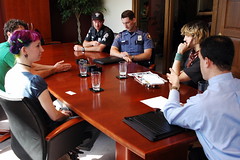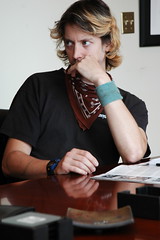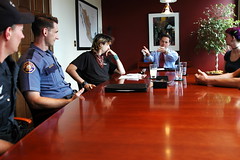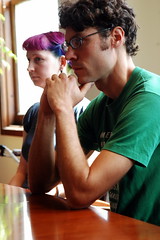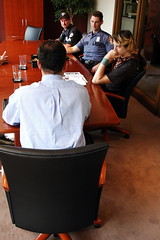In a meeting room nine floors above Pioneer Courthouse Square in downtown Portland, bike lawyer Mark Ginsberg hosted a mini-summit Thursday between representatives of Zoobomb and the Traffic Division of the Portland Police Bureau.
In attendance from Zoobomb were Dave Terry, Corey Sevigny, and Leah Bendlin. From the PPB were Commander Mark Kruger and motorcycle officer Sergeant Mike Fort.
Before I share my recap of the meeting, let’s look at the events that led up to this meeting…
It has been over a year since tensions between Police and Zoobomb participants have reached the “sit down” point. In June 2006 the two discussed the issue of riding on Highway 26 (a route known as “Hellway”). At that meeting, both sides aired their concerns and returned to their respective corners without any low punches.
Things remained tranquil on the hill up until June of this year when Kruger began to receive complaints from West Hills residents (including the president of the Arlington Heights Neighborhood Association) about how the Zoobombers were careening dangerously around blind curves, not stopping for traffic lights or signs, and riding without lights.
A few weeks later Kruger got another complaint about the Zoobombers. This time it was from PDOT construction crews who said they disobeyed flaggers orders at a work site on W. Burnside Avenue (a popular downhill route).
Then, on July 15th, Kruger’s officers set up a sting operation to catch Zoobombers running a stop sign in the parking lot of the Children’s Museum (read the reaction on the Zoobomb Forum). Riders claimed the show of force was excessive and unneccessary. Kruger said the enforcement was done to deter riders from their ultimate destination: the “Hellway” (Highway 26).
According to Joseph Rose, who wrote about it in the Oregonian, that sting netted 14 Zoobomber citations. The following week, 10 citations were written on residentials streets in the West Hills.
With tickets being written faster than a speeding mini-bike, concerns from Zoobombers that police resources could be put to better use, and the local media hot on the story, it was clear that a bi-lateral summit was needed.
Stepping up to his usual role of mediator and buffer between cyclists and the police was lawyer (and chair of the Portland Bicycle Advisory Committee) Mark Ginsberg.
So now, on to the meeting.
Commander Kruger brought two main concerns to the table:
- Illegal riding in the lanes of Highway 26 (the same concerns he had last year)
- Various complaints of traffic violations and a concern for safety from West Hills residents
Riding on Highway 26
Known as Hellway, the route is a popular thrill-ride for some Zoobombers. Riding on the Highway is 100% legal, but Kruger’s concern stems from video he has (and which he has willingly shared with local TV stations) of ‘bombers swerving way out into motor vehicle lanes. Kruger finds that activity “unacceptable”.
In their defense, the ‘bombers say they only leave the shoulder because it is full of debris and raised manhole covers that would cause serious harm to a rider on a mini-bike going 35-40 mph.
The following is my attempt at a detailed recap. Unless bound by quotes, the following statements are paraphrased from scribbled notes.
Terry: We advise helmets and lights on Hellway, but we can’t control what everyone does. Besides, our lights aren’t good enough to see hazards.
Ginsberg: Maybe ‘bombers can pass out flyers at start of ride warning of dangers and encouraging legal riding behavior.
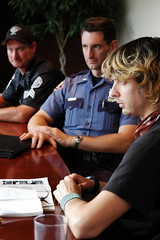
L to R: Fort, Kruger, Terry
(File photo) |
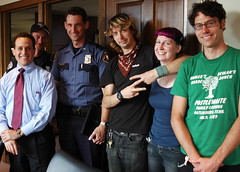
L to R: Ginsberg, Fort, Kruger, Terry, Bendlin, Sevigny
(File photo) |
Terry: I’m opposed to flyers because they’ll end up as litter. “We prefer to use the oral tradition.”
Bendlin: We do a safety shpeel before each run, but flyers represent authority, which is not very well-received on the hill.
Kruger: I’d say your flyers are a preferable authority to us showing up.
Kruger said his video shows that they don’t leave the shoulder simply due to hazards. Kruger also said he drives on that stretch of highway on his daily commute and he thinks the shoulders are wide and clean. He said perhaps the problem is that they’re riding too fast for the conditions. He reiterated his main concern is with a drunk motorist hitting a bicyclist from behind.
Traffic violations and complaints from West Hills residents
Kruger: What can you guys do so that we stop getting these complaints?
Sevigny: I don’t feel the police presence is a good use of resources. There are more effective places for 10 officers on a Sunday night. Driving 65mph in a 55mph zone is illegal too, but it’s reasonably safe, much like a bicyclist rolling a stop sign. In the five years of Zoobomb, we’ve never had a serious collision with an automobile.
Kruger: I’d quibble with the “use of resources” point. Of the 130,000 citations we issue, only 1% go to bicyclists and we do a lot of speed and drunk driving enforcement.
Kruger then explained that their “servicing of complaints is based on the intensity of the violations” that occur when they go out to observe them. He also mentioned an increase in complaints since the Oregonian article.
Kruger: We’d rather not spend a lot of time on the Zoobombers, there are other things we’d rather do.
Ginsberg: Corey, how do you plan to address the neighborhood complaints?
Sevigny: It’s an open community, and so we’ve got a lot of yahoos that show up. Of the regulars, way over 90% have helmets and lights and ride responsibly.
Terry: We have some influence over what people do, but not control.
Kruger then brought up the issue of riders not staying in the proper lane on residential streets.
Terry: We used to have a system where people in front would yell, “Car!”. That worked well until people in the neighborhood complained that it was too loud.
Kruger then brought up a video he has that shows Zoobombers speeding by the camera in a flash, blowing through controlled intersections.
Terry reiterated that these were fringe elements (“yahoos” was the word of the day) to which Kruger replied (with my favorite quote of the day), “I understand the peculiarities of your organizational model.”
The Zoobombers did a good job of making the case that much of things Kruger has issues with are due to these “yahoos” that they have little control over.
Then Kruger wondered what a solution could be for dealing with the “yahoos”.
Kruger: “Should we show up with an officer presence at the start to put a scare into the yahoos? What can we do, as police, to help you bring these outsider elements back to the center?”
(Note: Kruger’s tone in saying this was not heavy-handed, rather it sounded cooperative and sincere.)
Terry: “(Having a cop at the start, or on the hill is) not a good idea. We’d much rather have you give us a chance to influence them ourselves. We want to be the self-cleaning oven so you guys can be out there busting drunk drivers.”
At this point, there was a real esprit de corps in the room and all three Zoobombers expressed that the meeting had been a great, and needed, step in the right direction.
Then, throwing a wet blanket on the mood, Kruger brought up alcohol consumption on the hill. He recommended that more peer pressure should be used to discourage drinking. If not, Kruger said if they ever bust a Zoobomber for a DUII, they “will not hesitate to make a big deal of it and let the whole world know.” This ominous statement implied that the resulting PR would be a very bad thing for the Zoobombers.
Again the ‘bombers said how difficult it is to control what everyone does but they nodded in agreement to Kruger’s warning and suggestion for more peer pressure.
Final analysis
Kruger plans to closely monitor Highway 26 riding and will communicate with Ginsberg if/when they plan an enforcement mission in the area. He also plans to send an officer to monitor the West Hills. He reiterated that the ‘bombers should do their best to exert peer pressure to some of the fringe elements.
The Zoobombers were very appreciative to have Kruger’s concerns clarified and the mood at the end was generally upbeat (as the group photo can attest).
What happens now is anyone’s guess. Were both sides being sincere, or was this all just posturing? It sounded and felt sincere to me, but I tend to not be as cynical as I probably should be in situations like this.
Matt Davis at the Mercury wrote that the meeting was, “a merry little rhetorical dance” and that it was only done “in response to an Oregonian article…The cops don’t want to look stupid in the press. And who can blame them.”
My sense is that Kruger would rather not deal with this issue, but that he has no plans to turn a blind eye as long as egregious traffic violations (which he feels are unacceptably dangerous) continue to take place.
I also think that some veteran Zoobombers are wary of what could happen if their beloved activity stays on the radar of the PPB. They seem to understand that if they don’t at least attempt to make some changes, they’ll continue to be under the microscope, which they clearly would like to avoid.
Time will tell how this all ends up, but this meeting definitely seemed to smooth over a frayed relationship.


